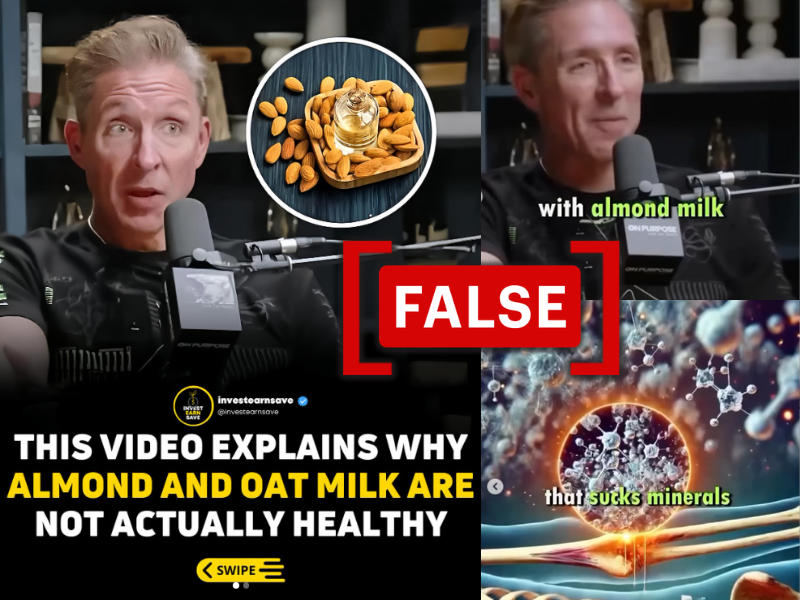By: Karin Koronen
September 20 2024
 Source: Instagram/Screenshot/Modified by Logically Facts
Source: Instagram/Screenshot/Modified by Logically Facts
Phytic acid can reduce mineral absorption in some circumstances, but it does not extract minerals from your bones.
Context
A video featuring American author Dave Asprey is circulating on Instagram, discussing the supposed dangers of almond and oat milk due to their high levels of phytic acid. In the video, which originates from the Jay Shetty Podcast (0:46:36), Asprey repeatedly claims that phytic acid "sucks minerals out of your bones," citing this as a reason to avoid these plant-based milks. The video was shared by the account @investearnsave, to an audience of 1.7 million followers; it has also gained over 592,000 views on YouTube.
Asprey, sometimes referred to as the "father of biohacking," is known for advocating a high-fat, low-carbohydrate diet known as the Bulletproof diet. Throughout his career, he has made multiple claims criticized by experts as unsustainable and pseudoscientific.
Logically Facts found that the claim that phytic acid sucks minerals out of your bones is false.
In fact
Professor Emeritus Dr. Fred Brouns works in the Department of Human Biology at Maastricht University in the Netherlands and has over 35 years of experience in the field of nutrition sciences and health. He told Logically Facts: "NO phytic acid does not 'suck' minerals from bones. There is no mechanism by which it could do that."
Phytic acid, found in foods like nuts, legumes, and grains, binds to minerals in the acidic environment of the stomach, forming compounds called phytates. As pH increases in the small intestine, these compounds solidify, reducing the availability and absorption of minerals. This can lead to mineral deficiencies under certain dietary conditions or imbalanced nutrition.
According to Brouns, as phytates cannot be absorbed in the small intestine, they are passed to the large bowel. There, the microbiota can break down phytates, releasing the bound minerals for absorption, he explained to Logically Facts.
"This process is boosted in an acid environment which will be present when appropriate dietary fibers are consumed and fermented in the colon," Brouns added. Additionally, free phytic acid, released in this process, may also act as a powerful antioxidant and reduce cancer risk, according to multiple scientific papers (see here, here, and here).
Therefore, phytic acid reduces the absorption of certain minerals by binding to them but does not deplete minerals from bones or tissues. This reduced absorption is mainly a concern for people whose diets are high in phytic acid and low in other nutrient sources, such as in low-income countries where access to mineral-rich foods is limited. According to Brouns' research, the advice to avoid the consumption of whole grain foods because they contain phytic acid is unjustified.
The verdict
The claim that phytic acid "sucks minerals out of your bones" is false. While phytic acid can affect mineral absorption in some ways, it has no mechanism to remove minerals directly from the bones. This claim has no basis in scientific evidence.